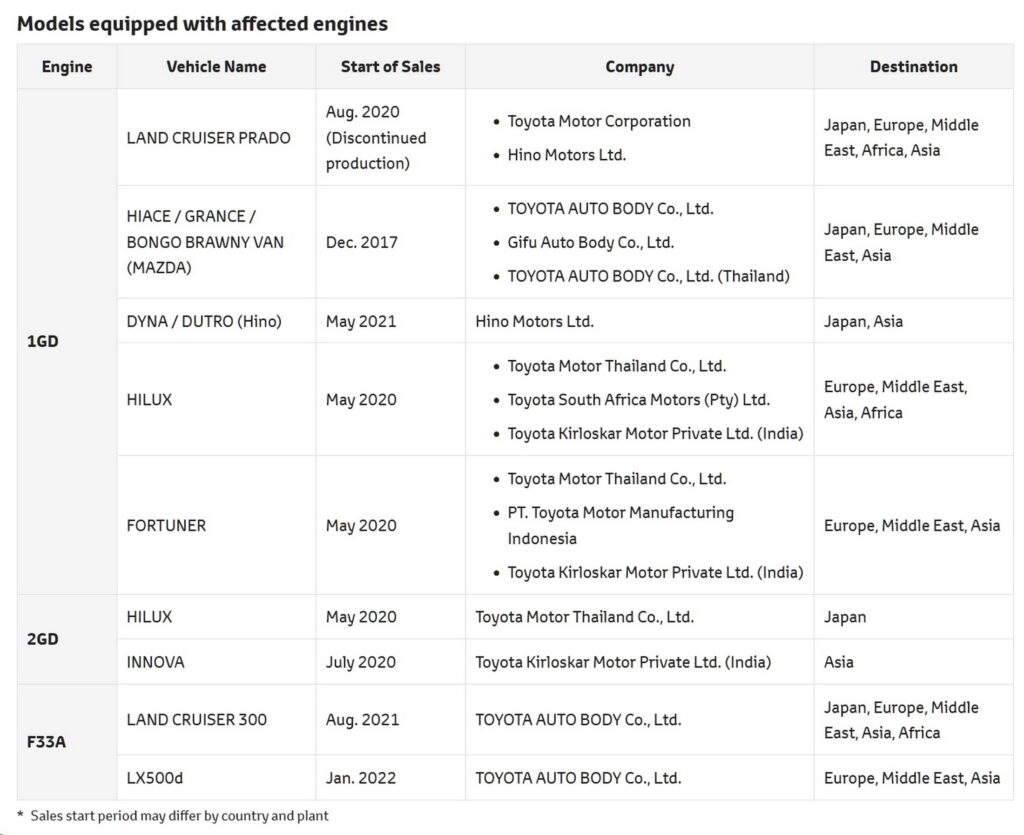The Toyota group has suspended the delivery of 10 vehicles due to certification irregularities associated with diesel engines manufactured by Toyota Industries Corporation (TICO). This problem affects cars from the Toyota, Lexus, Mazda, and Hino brands.
The company acknowledged that power output data had been manipulated for 10 of its models sold globally, marking the latest setback for the world’s largest automaker group, following earlier scandals at Toyota-owned small carmaker Daihatsu and truck affiliate Hino Motors.
“We sincerely apologize for causing tremendous trouble to our customers,” said Toyota President Koji Sato during a press conference in Tokyo, according to Kyodo News. Sato added that the company is committed to addressing this issue as swiftly as possible.
The problem came to light after Toyota commissioned an independent investigation committee to look into irregularities with forklifts and construction equipment, but was eventually found to affect vehicles such as the Toyota Land Cruiser Prado, Hilux, Fortuner, and Land Cruiser 300, as well as the Lexus LX500d, the Hino Dyna, and the Mazda Bongo Brawny van. However, the all-new Land Cruiser 250, which will also be sold in North America, is not affected by this issue.
Toyota states that the vehicles were all equipped with diesel engines whose ECUs were different from those used in testing. In a statement released on Monday, the company explained that an affiliate had used software to measure horsepower output, which made the “values appear smoother with less variation”. The automaker told Autonews that it has no impact on the engines’ performance during emissions tests.
The automaker claims it has re-verified engines manufactured for mass production models and found that they meet output standards. That means that vehicles in the field can continue to be used. However, TICO has stopped shipping the engines, and Toyota has halted deliveries of affected vehicles.
Read: Toyota’s Hino Accused Of Falsifying Emissions Data For Nearly 20 Years
That will impact customers in Japan, Asia, the Middle East, Africa, and Europe, where these vehicles are sold. In all, around 84,000 vehicles around the world were sold with suspect engines, and that the engines started being shipped in 2020.
Toyota says that it will work with authorities to remedy this issue, and it will allow witnesses to be present during horsepower tests. Reuters reports that Japan’s transport ministry will conduct an on-site investigation of TICO’s Hekinan plant, where the engines are produced.
This is just the latest certification issue to affect one of Toyota’s business partners. In 2022, Hino was found to have falsified emissions data for its commercial trucks, and a little later Daihatsu Motors admitted to problems with the safety of some of its vehicles. Both problems affected Toyota vehicles as well.





